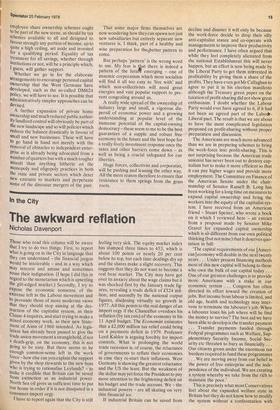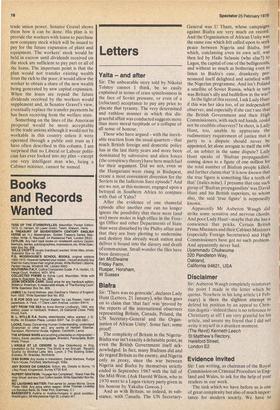In the City
The awkward reflation
Nicholas Davenport
Those who read this column will be aware that I try to do two things: First, to report
What is going on in the City in language that they can understand — the financial jargon would be intolerable — and in a way which may interest and amuse and sometimes rouse their indignation. (I hope I did this in regard to the monetarism which is upsetting the gilt-edged market.) Secondly, I try to expose the economic nonsense of the extreme left in the Labour movement and to persuade those of more moderate views that they should stop aiming at the destruction of the capitalist system, as their Clause 4 requires, and start trying to make a mixed economy work, as their new Statement of Aims of 1960 intended. As legislation has already been passed to give the trade union movement a stranglehold, if not a death-grip, on the economy, this is not going to be easy. But there seems to be enough common-sense left in the work force —how else can you explain the support given by the shop stewards to the new boss Who is trying to rationalise Leylands? — to make it credible that Britain can be saved from extinction as an industrial power. North Sea oil gives us sufficient time to put our house in order if it is not dissipated in a consumer-import orgy.
I have to report again that the City is still feeling very sick. The equity market index has slumped three times to 453, which is about 100 points or nearly 20 per cent below its top, but each time dealings dry up and the shares make a slight recovery. This suggests that they do not want to become a real bear market. The City may have got over its anxiety about the wage claims but it was shocked first by the January trade figures, revealing a trade deficit of £324 million; and secondly by the national output figures, disclosing virtually no growth in 1977. All this points to the real danger of an import orgy if the Chancellor overdoes his reflation (by tax cuts) of the economy in his 11 April budget. The Economist estimates that a £2,000 million tax relief could bring on a payments deficit in 1979. Professor Lord Kaldor is arguing forcibly for import controls. What is prolonging the world trade recession is, of course, the reluctance of governments to reflate their economies in case they re-start their inflations. West Germany is showing the greatest reluctance and the US the least. But the weakness of the dollar may yet force the President to pay more attention to the frightening deficit on his budget and the trade account. We — the industrial powers — are all skating on very thin financial ice.
If industrial Britain can be saved from decline and disaster it will only be because the work-force decide to drop their silly anti-capitalist stance and co-operate with managements to improve their productivity and performance. I have often argued that while they feel completely alienated from the national Establishment this will never happen, but an effort is now being made by the Liberal Party to get them interested in profitability by giving them a share of the profits. They have even got Mr Callaghan to agree to put it in his election manifesto although the Treasury green paper on the taxation of profit-sharing did not show great enthusiasm. I doubt whether the Labour Party would ever have agreed to it, if it had not been an agreed part of the LaboillrLiberal pact. The result is that we are about to have the most complicated legislation proposed on profit-sharing without proper preparation and discussion.
The Americans are much more advanced than we are in preparing schemes to bring the work-force into profit-sharing. This is not surprising because the American trade unionist has never been out to destroy capitalism but to make it more efficient so that it can pay higher wages and provide more employment. The Committee on Finance of the American Senate under the chairmanship of Senator Russell B. Long has been working for a long time on measures to expand capital ownership and bring the workers into the equity of the capitalist system. I have received from an American friend — Stuart Speiser, who wrote a book on it which I reviewed here — an extract from a proposal made by Senator Mike Gravel for expanded capital ownership which is so different from our own political thinking (but not mine) that it deserves quotation in full: 'The capital requirements of our [American] economy will double in the next twenty years . . . Under present financing methods most of this new capital will belong to those who own the bulk of our capital today . . . One of our greatest challenges is to provide more Americans with a stake in our economic system . . . Congress has often directed its effort toward the creation of jobs. But income from labour is limited, and old age, health and technology may intervene to terminate the labourer's job. When a labourer loses his job where will he find the money to survive? The best aid we have been able to develop is the transfer payment . . . Transfer payments funded through Federal programmes such as Welfare, Supplementary Security Income, Social Sec urity etc threaten to bury us financially. . . Our citizens groan under the enormous tax burdens required to fund these programmes . . . We are moving away from our belief in the power of free enterprise and the independence of the individual. We are creating a system whereby we take from the rich to maintain the poor.'
This is precisely what most Conservatives feel about the expanded welfare state in Britain but they do not know how to modify the system without a confrontation with trade union power. Senator Gravel shows them how it can be done. His plan is to provide the workers with loans to purchase new company stock which will beissued to pay for the future expansion of plant and equipment. The workers' stock would be held in escrow until dividends received on the stock are sufficient to pay part or all of the loans. The important point is that the plan would not transfer existing wealth from the rich to the poor; it would allow the worker to obtain a share of the new wealth being generated by new capital expansion. When the loans are repaid the future dividends received by the workers would supplement and, in Senator Gravel's view, eventually replace the transfer payments he has been receiving from the welfare state.
Something on the lines of the American proposal would be more acceptable to the trade unions although it would not be workable in this country unless it were operated through a public unit trust as I have often described in this column. I am surprised that no Liberal or Labour politician has ever looked into my plan — except one very intelligent man who, being a Cabinet minister, cannot be named.



































 Previous page
Previous page